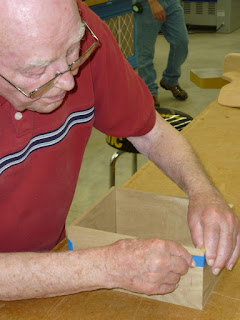
When I was first introduced to what became an exploration of my hands and their functioning in relation to my brain, not as a scientist, but as a craftsman, I had been told by a fellow craftsman that my brains were in my hands, not as a general statement, applying to all but one that reflected what he had observed as a natural inclination in my personal case.
I am aware that I tend to write in a convoluted manner that requires the reader to slow down and carefully parse what I write. If it's not worth it to you, speed on.But if you have noticed the power of your own hands to engage your own learning, let's savor a ideas things together.
As a craftsman, I spent years observing my own relationship with my hands, and considering whether or not, I was in any way different from anyone else other than my purposeful engagement of my hands in learning.

Long before my time, observers hand noted the special relationship between the hands and brain. A noted Greek philosopher Anaxagoras had noticed that man is the wisest of all animals because he has hands. More recently, Frank Wilson, in his book on the hands noted that the hands and brain co-evolved as a system deeply rooted in the human genome. Others had noted that while the hands and eyes and other sensory systems rely upon each other and work in harmony with each other, the hands operate at a particular depth at which the truth is more readily ascertained and the engagement of the intellect is more readily sustained. Does a surface look smooth? perhaps. But the hands will prove it or disprove it down to a micron, and need little participation of the brain in the process. Have you looked over a broad ocean and wondered why lies beneath? It is only through the creative powers of the hands, and their constructions that we've penetrated the depths of things.
At this point, scientists at Umeä University in Sweden have determined that the hands and brain do indeed serve as s system, and that some tactile processing that we have previously attributed to the brain takes place in the hands, rather than in the brain as all have presumed.
Edge orientation processing in first-order tactile neurons.
But when it comes to schooling, the hands are neglected and eschewed. "Keep your hands to yourself," they say, and remain bored and detached forever after.
As I was at the Historic Arkansas Museum on Friday night, I watched as visitors struggled with a dilemma. Is it OK to touch? and of course the signs say no. But the consequence is that the admirers are kept at arms length... a good thing for protecting the quality of the work, but a not so good when it comes to engagement in the understanding of it. Even I had difficulty keeping my hands off my own work, when visitors asked me to explain it to them.
Still, the way to fix things in schooling and in life is to put the hands purposefully in play. We, as a species, learn best, to greatest depth, and to most lasting effect when we learn hands on.
On that subject, I need to mention an opportunity. August 10-14, 2015 I will have a class at the Eureka Springs School of the Arts on vacuum veneered boxes. The class will be held in my Clear Spring School woodworking studio/classroom. So far only 1 student is enrolled and I'll need at least two more for the class to proceed. Unlike most of my classes in box making where a large number of students are enrolled. This class will be an opportunity for more personal attention and hands-on direction than is usual in my larger classes. Go to
essa-art.org to learn more. Even if you are not interested in veneered boxes, specifically, general box making will be covered and you will walk away with beautiful boxes you will have made with your own hands.
Make, fix and create...
 My students and I (along with assistants Doug Dale and and Jerry Forshee) finished our 5 day box making class at Marc Adams School of Woodworking and I am on my way back to Arkansas.
My students and I (along with assistants Doug Dale and and Jerry Forshee) finished our 5 day box making class at Marc Adams School of Woodworking and I am on my way back to Arkansas.













































